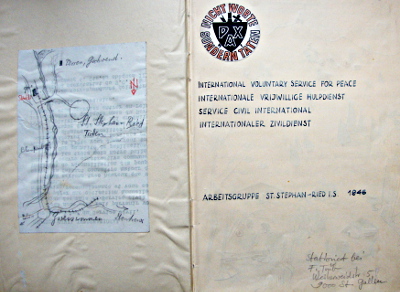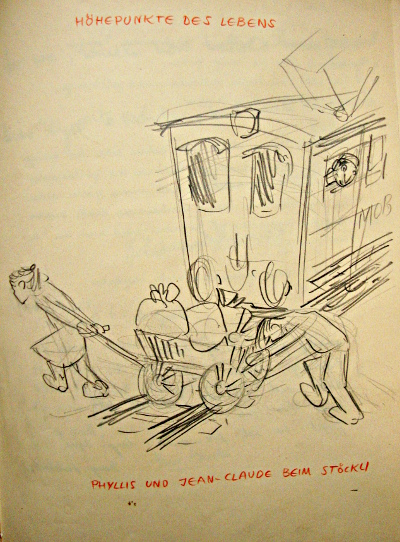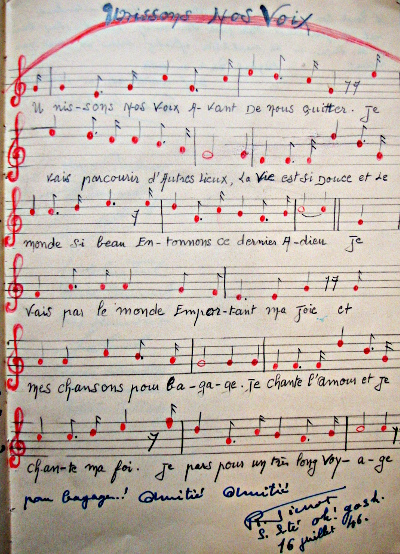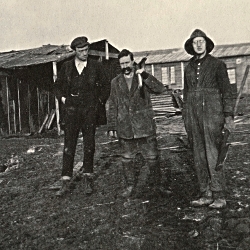Service Civil International
St. Stephan Workcamp Diary, 1946
by Heinz Gabathuler (Feb 23, 2017)
 For this and the next issue of From the Archives I had placed two nice objects on the shelf next to my desk some time ago already – but then I learned about the death of a very old friend from the Swiss branch of SCI, Fridolin Trüb (see article Swiss SCI veteran and lifelong peace activist Fridolin Trüb died, at age 97), and so I changed my mind and chose an object that is strongly related to this extraordinary SCI volunteer and peace activist.
For this and the next issue of From the Archives I had placed two nice objects on the shelf next to my desk some time ago already – but then I learned about the death of a very old friend from the Swiss branch of SCI, Fridolin Trüb (see article Swiss SCI veteran and lifelong peace activist Fridolin Trüb died, at age 97), and so I changed my mind and chose an object that is strongly related to this extraordinary SCI volunteer and peace activist.
It is one of the nicest, and actually funniest objects to be found in the Archives: A diary from the service in St. Stephan (Bernese Oberland / Swiss Alps) where during four months between end of April and end of August 1946 – with most of the volunteers only present for a few weeks – large pieces of flood-devastated farmlands had been cleared: In these times, even in a wealthy country like Switzerland that had been preserved from the horrible war that had just ended, SCI camps (the French term chantier is used several times in the diary) were used to give local, mainly rural population relief from natural disasters. In other words: SCI back then was mainly a humanitarian organisation.
 More than half of the participants were Swiss, from both the German and the French speaking part. International participation was pretty limited: The diary lists volunteers from France, the Netherlands, and England. No Germans – a German SCI branch only evolved towards the end of the year out of the first service in Friedland (see article The Friedland 1946 Workcamp diary facsimile).
More than half of the participants were Swiss, from both the German and the French speaking part. International participation was pretty limited: The diary lists volunteers from France, the Netherlands, and England. No Germans – a German SCI branch only evolved towards the end of the year out of the first service in Friedland (see article The Friedland 1946 Workcamp diary facsimile).
Female participants were called sisters, and they were responsible for housework. Fridolin was the campleader for the first part of the service until mid-July, and even though many different volunteers left their traces in the diary, it is his drawings (he was a drawing teacher by profession, and a dedicated artist throughout his whole life), his texts, and also his handwriting, that make this book so unique. The daily schedule of ordinary working days is titled "Iron skeleton of a wobbly programme". A situation map shows, among others, the French volunteer Pierre Martin, sitting on top of the mountain "apparently looking for the Eiffel tower". A hiking trip to the next village is reported as if it was a freakshow. The "highlights" section of the diary mentions a "playing evening with disturbance of the night’s rest", and a visit by SCI secretary Ralph Hegnauer who took home a wounded finger as a memory from a dam construction on the working site. A drawing titled "highlights of life" shows two volunteers trying to cross the railway line with a heavily loaded handcart. On almost every page, he proves an abundant sense of humour which probably – we can only assume this – had been influenced by the fact that during his time in St. Stephan he fell in love with his female leader counterpart, the 'headsister' Elisabeth Mauch whom he had just met for the first time when getting prepared for the service. She later became his wife.
 Ralph Hegnauer himself wrote a few lines on the essence of the SCI community: "joyful giving and free talking. Its teleology: Cooperation, conviviality, empathy, friendly service." [translated from German]. Fridolin and another participant contributed text and notes of two songs to the diary. And carefully looking at the list of participants, I discovered Theodora Boeke from Bilthoven, the Netherlands. She was the daughter of Kees Boeke, the man who had hosted the conference where the idea of international voluntary service had been born (see article t'Boschhuis). Fridolin Trüb, by the way, had been born exactly when this conference took place, in October 1919, he was thus older than SCI itself. He died in February 2017, and it is very likely that he had been the last surviving participant of the service documented in this diary.
Ralph Hegnauer himself wrote a few lines on the essence of the SCI community: "joyful giving and free talking. Its teleology: Cooperation, conviviality, empathy, friendly service." [translated from German]. Fridolin and another participant contributed text and notes of two songs to the diary. And carefully looking at the list of participants, I discovered Theodora Boeke from Bilthoven, the Netherlands. She was the daughter of Kees Boeke, the man who had hosted the conference where the idea of international voluntary service had been born (see article t'Boschhuis). Fridolin Trüb, by the way, had been born exactly when this conference took place, in October 1919, he was thus older than SCI itself. He died in February 2017, and it is very likely that he had been the last surviving participant of the service documented in this diary.
Â
Heinz Gabathuler, International Archives Coordinator
Â
Reference
In the International Archives, this precious little book has been given the number 11261.01, among numerous objects and documents Fridolin had left to the Archives a few years ago.



